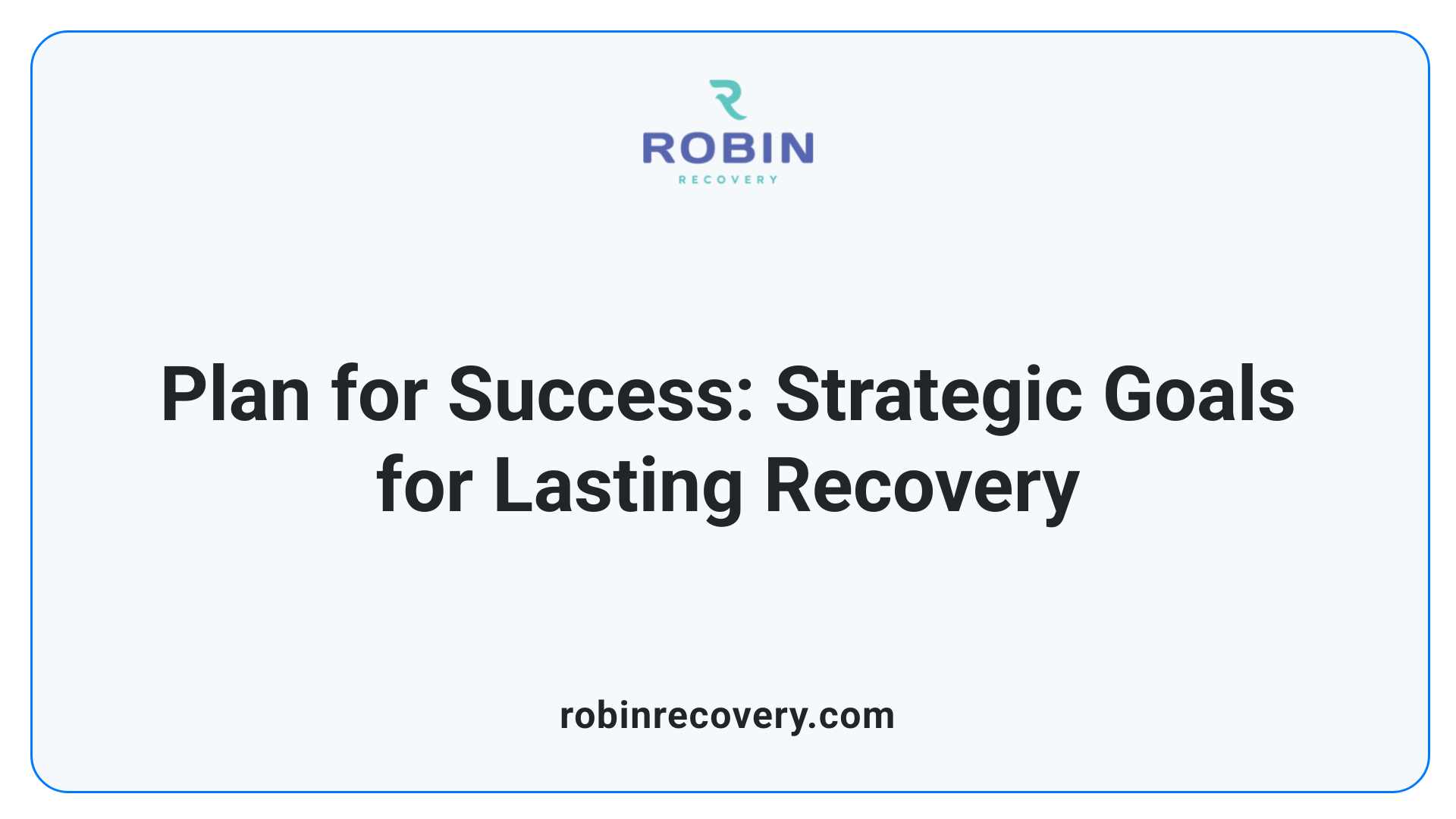How to create a vision for your future after addiction

Envisioning Your New Beginning After Addiction
Recovering from addiction is a profound journey of transformation, one that involves not just maintaining sobriety but also crafting a compelling vision for a fulfilling and sustainable future. This article explores how you can develop a recovery-oriented vision, set actionable goals, rebuild your identity, and discover purpose, ultimately leading to a meaningful life beyond substance dependence.
Strategic Goal Setting for a Sustainable Future

What are effective strategies for setting long-term goals and planning for life after addiction?
Achieving lasting recovery from addiction involves more than just staying sober; it requires envisioning and working towards a vibrant future. One of the most effective strategies is employing the SMART framework—setting goals that are Specific, Measurable, Achievable, Relevant, and Time-bound. This approach helps individuals create clear and realistic objectives across life areas such as health, employment, finances, relationships, and personal growth.
Breaking down large, long-term goals into smaller, actionable steps makes the journey less overwhelming and provides a sense of accomplishment along the way. For example, if a goal is to return to a career, smaller steps might include updating a resume, completing relevant training, or applying for jobs. Regularly tracking progress—using tools like journals, spreadsheets, or apps—enables individuals to see their advancement, celebrate milestones, and boost confidence.
Celebrating achievements no matter how small reinforces motivation and demonstrates tangible proof of progress. It’s also essential to remain flexible, adjusting goals to reflect changing circumstances or new insights. This adaptability ensures continued growth without feeling defeated by setbacks.
Building a support network with professionals like therapists, mentors, support groups, and trusted friends creates accountability and encouragement. Sharing goals with others fosters a sense of community and shared purpose.
Finally, adopting a holistic view of recovery that integrates physical, emotional, social, and spiritual health fosters a balanced and sustainable lifestyle. By prioritizing overall well-being, individuals can develop resilience, fulfill their potential, and sustain their sobriety in the long run.
Strategy Focus Area Details Use SMART goals Goal clarity Helps define clear, attainable objectives Break goals into steps Manageability Makes big goals achievable through smaller tasks Track progress Motivation Keeps motivation high through visible achievements Celebrate milestones Confidence boosting Reinforces commitment and positivity Foster support networks Accountability Ensures ongoing encouragement and guidance Embrace holistic approach Overall well-being Promotes physical, emotional, and social health
Pursuing well-planned, thoughtful goals creates a roadmap for life after addiction. It transforms hope into action, paving the way for a fulfilling, balanced, and lasting recovery.
Visualizing Growth and Rebuilding Identity

How can I visualize personal growth and rebuild my identity after overcoming addiction?
Rebuilding your identity after addiction involves creating a clear, positive mental image of the person you want to become. Techniques like visualization and imagery are powerful tools in this process. Start by imagining your best self—someone who is resilient, confident, and living a healthy, purposeful life. Picture yourself engaging in activities that reflect your new identity, such as pursuing hobbies, building relationships, or achieving career goals.
Reflective practices are equally important in clarifying your core values and strengths. Journaling about your aspirations, noting your progress, and contemplating what truly matters to you can reinforce your commitment to change. These exercises help you define a new narrative that moves beyond the label of past addiction, emphasizing your potential and personal qualities.
Involving social and community activities supports your identity transformation. Participating in support groups, volunteering, or joining interest-based organizations fosters a sense of belonging and social connection. These interactions affirm your new self-image and provide encouragement.
Therapy and support groups also play a vital part in reconstructing your identity. Working with professionals can help you explore past experiences, develop new coping strategies, and shape a healthier self-view. Connecting with others who share similar journeys reinforces feelings of purpose and collective growth.
Using visual journaling or guided imagery makes your vision of change tangible. Creating visual boards or writing detailed narratives about your ideal future can serve as daily reminders of your goals.
In essence, effective transformation combines visualization, reflection, social involvement, and professional support. This integrated approach fosters a resilient, positive self-identity that encourages ongoing growth beyond addiction.
Creating a Clear and Purposeful Recovery Vision

How can I develop a clear, positive, and recovery-oriented vision for my future after addiction?
Building a meaningful future after addiction begins with envisioning a life beyond substance use. Visualization techniques are powerful tools for creating this mental picture. One effective method is episodic future thinking, where you vividly imagine yourself achieving important goals—whether it's rebuilding relationships, advancing your education, or securing meaningful employment.
To make this vision a reality, set specific and manageable short-term goals. Examples include attending support groups regularly, repairing a strained relationship, or beginning a new hobby. These initial steps serve as milestones that foster motivation and a sense of achievement.
Developing adaptable plans is essential. Life can be unpredictable, so your goals should be flexible to accommodate changing circumstances. Involving your support system—family, friends, counselors, or mentors—provides encouragement and accountability. Professional guidance from therapists can help tailor strategies that align with your values and strengths.
Regularly reassess your progress. Celebrate small victories and modify your goals as needed to stay motivated and resilient. Incorporate positive routines, like daily journaling or mindfulness meditation, to reinforce your commitment.
Mental exercises such as cue exposure—facing environmental triggers in controlled ways—and future-oriented visualizations help rewrite negative memories and strengthen your resolve. Focusing on personal growth and maintaining hope are vital. Viewing setbacks as opportunities to learn keeps your outlook optimistic.
Ultimately, cultivating a purposeful vision involves a combination of clear goal-setting, mental rehearsal, supportive relationships, and sustained hope. When these elements come together, they form a strong foundation for a resilient, fulfilling life beyond addiction.
Fostering Hope and Fulfillment After Addiction Treatment

How can I create a hopeful and fulfilling future following addiction treatment?
Building a hopeful and satisfying life after overcoming addiction starts with imagining oneself in a positive, healthy future. Envisioning a joyful life fuels motivation and helps maintain focus on long-term recovery goals. Practicing decision-making in the present by visualizing the future self and choosing recovery during difficult moments strengthens resilience and commitment.
Creating purpose plays a crucial role in this journey. Engaging in activities that matter—such as volunteering, exploring new hobbies, or fostering deepening relationships—confers ongoing meaning and helps individuals find more fulfillment beyond substance use.
In addition, mindfulness practices, gratitude exercises, and self-compassion techniques serve as vital tools for emotional resilience. These practices encourage living in the present moment, appreciating progress, and developing a flexible mindset capable of handling life’s ups and downs.
Setting realistic, actionable goals supports continuous growth. Connecting with supportive people, whether through family, friends, or recovery groups, reinforces motivation and provides encouragement.
Ultimately, cultivating a hopeful outlook involves ongoing effort—balancing goal setting, social support, and a positive attitude to realize one’s potential for a vibrant, substance-free life. It is a process of nurturing hope, purpose, and emotional flexibility to ensure long-lasting fulfillment in recovery.
Steps to Rebuild Your Life and Sustain Long-Term Recovery

What practical steps can I take to rebuild my life and establish a sustainable life plan after addiction?
Rebuilding life after addiction involves a series of proactive, consistent actions aimed at creating stability, purpose, and resilience. The first step is to complete a comprehensive treatment program, which may include medical detoxification, counseling, and holistic therapies. Committing to ongoing recovery efforts, such as participating in support groups like 12-step meetings, is crucial.
Establishing healthy routines forms the foundation for long-term sobriety. This includes maintaining a nutritious diet, engaging in regular physical activity, ensuring adequate sleep, and practicing mindfulness or meditation. These habits support both physical health and emotional well-being.
Developing a robust support network is essential. Surround yourself with family, friends, mentors, and professionals who understand recovery and can offer encouragement. Joining peer support groups provides shared experiences and motivation.
Personal growth plays a vital role as well. Setting realistic, achievable goals—such as improving relationships, pursuing education, or finding meaningful work—helps create a sense of purpose. Exploring hobbies or volunteer activities can foster fulfillment outside of substance use.
Prioritizing the avoidance of triggers and high-risk situations is crucial for maintaining sobriety. Developing effective coping strategies, such as mindfulness, deep breathing, or engaging in hobbies, equips you to handle cravings and emotional challenges.
Recovery is a dynamic process of continuous evaluation. Regularly reviewing your plan, celebrating milestones, and making necessary adjustments foster resilience. Remember, recovery is a lifelong journey that benefits from patience, persistence, and self-awareness, ultimately leading to a more fulfilling, substance-free life.
Rebuilding Motivation and Self-Identity for a Successful Future
How do I rebuild my self-identity and motivation for a successful future after overcoming addiction?
Recovering from addiction often involves a process of rediscovering who you are beyond substance use. Engaging in self-reflection to identify your personal strengths, core values, and achievements is essential. Reframing negative self-perceptions allows for healthier self-esteem and promotes a positive outlook.
Participation in therapy sessions, such as cognitive-behavioral therapy (CBT) or dialectical behavior therapy (DBT), provides tools to address underlying issues and develop healthy coping mechanisms. Joining support groups like 12-step programs or peer-led communities offers social connection, validation, and shared understanding, which boost motivation and a sense of belonging.
Setting purposeful goals and exploring interests or passions are vital steps toward creating a meaningful future. Pursuing new roles—whether in education, employment, or family life—helps restore confidence and reestablish a sense of purpose.
It is also important to recognize and accept past experiences, practicing self-compassion throughout the journey. Embracing the ongoing evolution of your identity allows you to adapt and grow, understanding that change is a gradual process.
Utilizing available resources such as the SAMHSA Helpline, community centers, and mentorship programs can provide additional guidance and support. Ultimately, rebuilding motivation and self-identity is about creating a new life story grounded in resilience, purpose, and hope.
Embracing a Future Full of Possibilities
Creating a vibrant, purpose-driven life after addiction is both an achievable goal and a lifelong journey. By setting thoughtful goals, visualizing growth, developing purpose, and actively rebuilding your identity, you lay a solid foundation for resilience and fulfillment. Remember, recovery is unique to each person, and patience combined with a proactive approach is the key to transforming hope into reality. Embrace the process, lean on your support systems, and look forward confidently to the bright future that awaits.
References
- A Vision for the Future: Goal Setting and Life Planning Key Aspects ...
- Create a Vision for Your Recovery with Who, What, Where, When ...
- VISION FOR THE FUTURE: A PUBLIC HEALTH APPROACH - NCBI
- Rebuilding Your Life and Finding Purpose After Addiction | RCA
- Make Plans for Your Future: An Important Step In Your Recovery
- Goals You Should Have For Long-Term Recovery
- The Road Ahead: Creating a Vision for a Brighter Future in Recovery
- 10 Tips to Design a Purposeful Life in Recovery | Willingway
- Recovery and Identity: Rebuilding Your Self After Addiction
